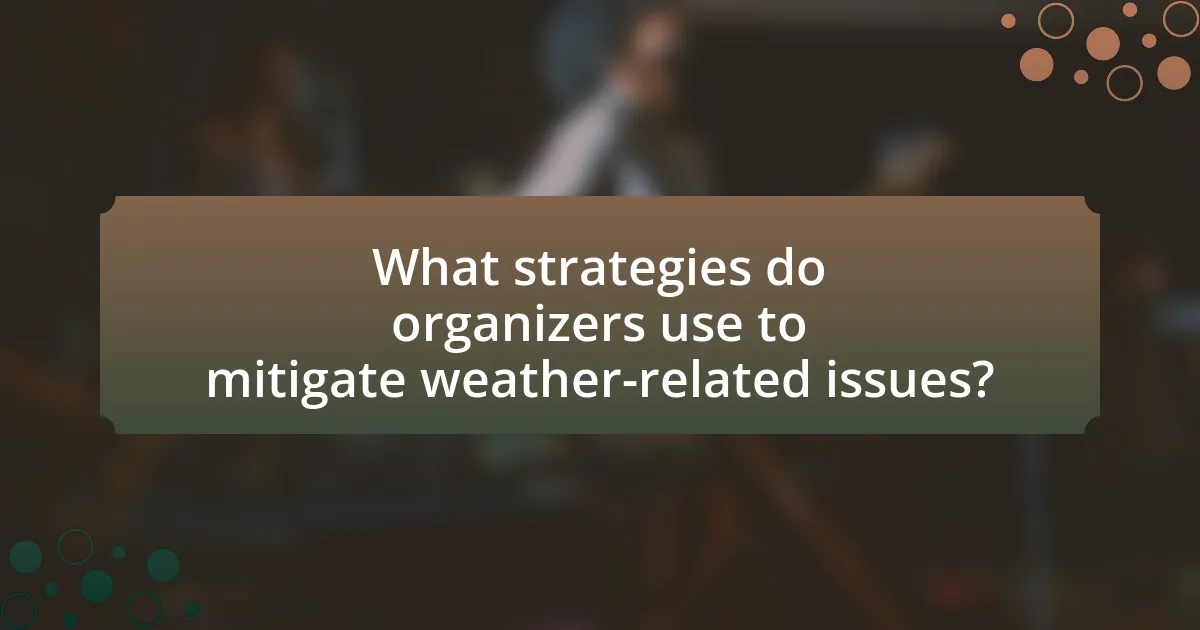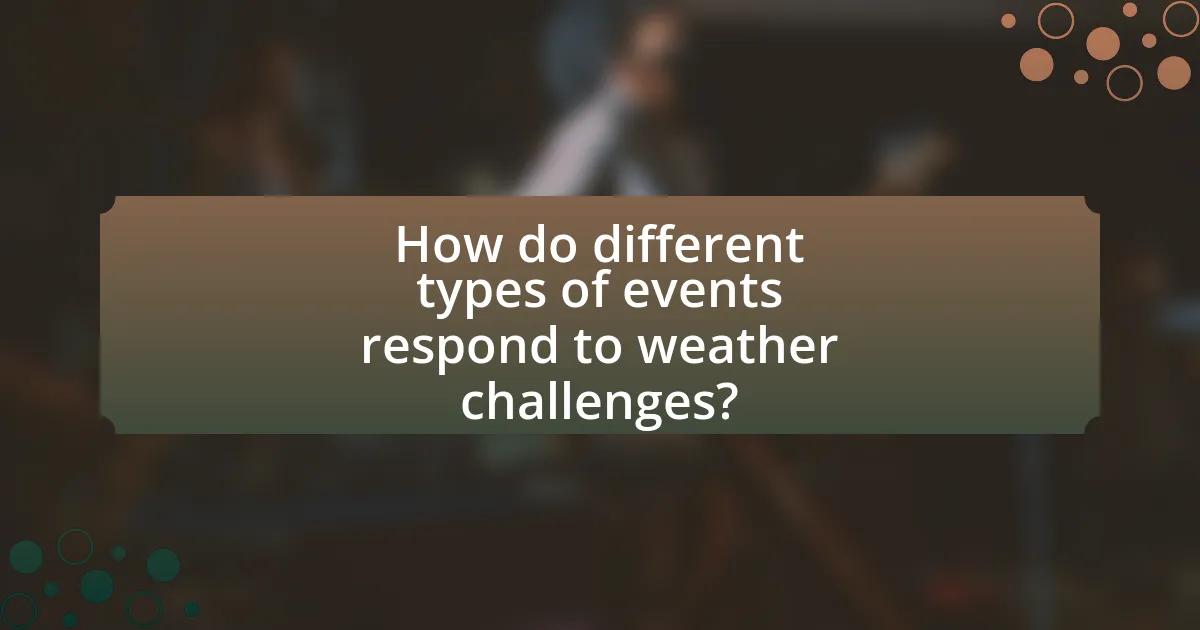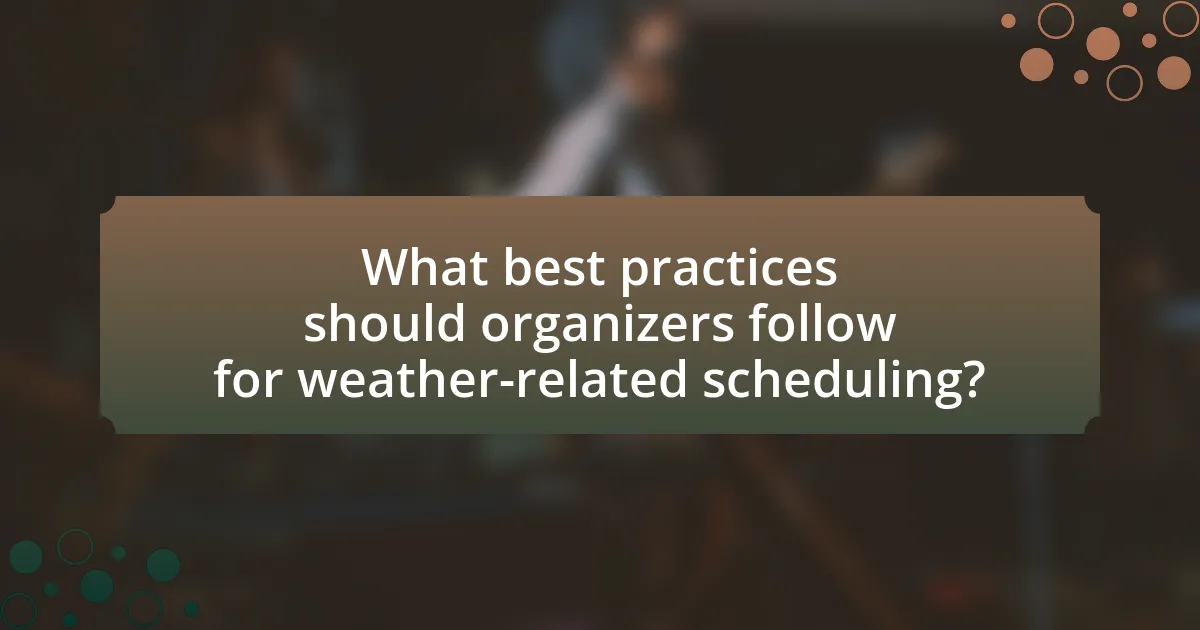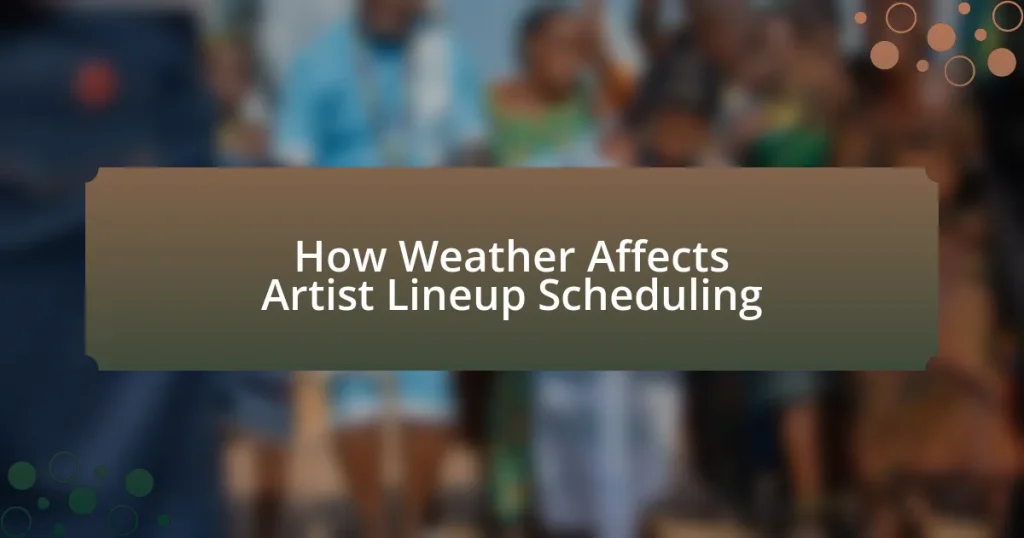The article examines how weather influences artist lineup scheduling, highlighting the impact of various weather factors such as temperature, precipitation, and wind conditions on audience attendance and performance quality. It discusses the necessity for event organizers to consider weather forecasts in their planning to optimize attendance and ensure safety. Key strategies for mitigating weather-related issues include flexible scheduling, contingency planning, and effective communication with artists and crews. Additionally, the article emphasizes the importance of utilizing technology for real-time weather tracking and the role of historical weather data in informing future scheduling decisions.

How does weather influence artist lineup scheduling?
Weather significantly influences artist lineup scheduling by affecting audience attendance and performance conditions. For instance, adverse weather conditions such as rain or extreme heat can lead to lower ticket sales and audience turnout, prompting organizers to adjust the lineup to accommodate more popular acts during favorable weather periods. Historical data from events like music festivals shows that attendance can drop by as much as 30% during inclement weather, which directly impacts scheduling decisions. Additionally, artists may have specific requirements for performance conditions, such as temperature or stage setup, which can further dictate how lineups are arranged.
What are the key weather factors that affect scheduling?
Key weather factors that affect scheduling include temperature, precipitation, wind speed, and severe weather events. Temperature influences outdoor event comfort levels and can dictate attendance; for instance, extreme heat or cold may deter participants. Precipitation, such as rain or snow, can lead to cancellations or delays, particularly for outdoor performances. Wind speed can impact sound quality and safety, especially for large structures like stages or tents. Severe weather events, including thunderstorms or hurricanes, necessitate immediate rescheduling or relocation to ensure safety. Historical data shows that events scheduled during adverse weather conditions often experience significant disruptions, underscoring the importance of these factors in planning.
How does temperature impact artist performance and audience attendance?
Temperature significantly impacts artist performance and audience attendance by influencing comfort levels and energy. High temperatures can lead to decreased audience turnout, as individuals may avoid outdoor events due to heat discomfort, while artists may experience fatigue, affecting their performance quality. For instance, a study published in the Journal of Environmental Psychology found that audience attendance at outdoor concerts dropped by 20% on days exceeding 90°F, highlighting the correlation between temperature and attendance. Additionally, artists performing in extreme heat may struggle with vocal performance and stamina, as evidenced by numerous reports from musicians who cite heat as a factor in their performance challenges during summer festivals.
What role does precipitation play in scheduling decisions?
Precipitation significantly influences scheduling decisions by impacting outdoor events and activities. When rain is forecasted, event organizers often need to consider postponing, relocating, or altering the format of events to ensure safety and maintain audience engagement. For instance, a study by the National Oceanic and Atmospheric Administration (NOAA) indicates that outdoor events can see a 30% decrease in attendance when rain is predicted, prompting organizers to adjust schedules accordingly. This data underscores the necessity for planners to incorporate weather forecasts, particularly precipitation predictions, into their scheduling strategies to optimize event success and audience satisfaction.
How do wind conditions affect outdoor performances?
Wind conditions significantly impact outdoor performances by influencing sound quality, safety, and audience experience. High winds can distort sound waves, making it difficult for audiences to hear performances clearly, as sound travels differently in windy conditions. Additionally, strong winds pose safety risks, potentially causing equipment to topple or creating hazardous conditions for performers and crew. For instance, the National Weather Service advises that wind speeds exceeding 20 mph can lead to increased risks for outdoor events. Therefore, event organizers must consider wind forecasts when scheduling performances to ensure optimal conditions for both artists and audiences.
Why is it important to consider weather forecasts in scheduling?
Considering weather forecasts in scheduling is crucial because adverse weather conditions can significantly impact attendance, safety, and overall event success. For instance, events scheduled during predicted rain or extreme temperatures may see reduced participation, as studies show that inclement weather can decrease attendance by up to 30%. Additionally, safety concerns arise when events are held in severe weather, leading to potential liability issues. Therefore, integrating weather forecasts into scheduling decisions helps optimize event planning, ensuring better outcomes and minimizing risks associated with unfavorable weather conditions.
How do accurate forecasts improve lineup planning?
Accurate forecasts enhance lineup planning by enabling event organizers to make informed decisions regarding scheduling and resource allocation. When weather predictions are precise, organizers can anticipate conditions that may affect attendance, artist performance, and overall event safety. For instance, a study by the National Oceanic and Atmospheric Administration (NOAA) indicates that accurate weather forecasts can reduce event cancellations by up to 30%, allowing for better management of artist availability and audience engagement. This leads to optimized scheduling that aligns with favorable weather conditions, ultimately improving the event experience for both artists and attendees.
What are the risks of ignoring weather predictions?
Ignoring weather predictions poses significant risks, including safety hazards, financial losses, and logistical challenges. For instance, severe weather events such as storms or extreme temperatures can endanger the safety of attendees and performers at outdoor events. According to the National Oceanic and Atmospheric Administration (NOAA), approximately 1,000 people die each year in the U.S. due to weather-related incidents, highlighting the critical need for awareness and preparedness.
Additionally, financial losses can occur when events are poorly attended due to adverse weather conditions, leading to decreased ticket sales and increased costs for rescheduling or canceling performances. A study by the University of Southern California found that events held during inclement weather can see attendance drop by as much as 30%.
Logistically, ignoring weather forecasts can complicate event planning, resulting in last-minute changes that may not be feasible or cost-effective. This can lead to a disorganized event experience, further impacting the reputation of the organizers and artists involved.

What strategies do organizers use to mitigate weather-related issues?
Organizers use several strategies to mitigate weather-related issues, including contingency planning, flexible scheduling, and the use of technology for real-time weather monitoring. Contingency planning involves having backup venues or alternative dates to ensure events can proceed despite adverse weather conditions. Flexible scheduling allows organizers to adjust performance times based on weather forecasts, which can minimize disruptions. Additionally, technology such as weather apps and radar systems enables organizers to receive timely updates, allowing for informed decision-making. These strategies are essential for maintaining event integrity and ensuring safety for attendees and performers.
How can flexible scheduling accommodate unpredictable weather?
Flexible scheduling can accommodate unpredictable weather by allowing event organizers to adjust performance times or locations based on real-time weather conditions. This adaptability ensures that events can proceed safely and effectively, minimizing disruptions caused by adverse weather. For instance, outdoor concerts can be rescheduled to earlier or later times, or moved indoors if severe weather is forecasted. Historical data shows that events with flexible scheduling have a higher success rate in maintaining attendance and participant satisfaction, as they can respond dynamically to changing weather patterns.
What are the benefits of having backup plans for performances?
Having backup plans for performances ensures continuity and minimizes disruptions caused by unforeseen circumstances, such as adverse weather conditions. These plans allow organizers to quickly adapt to changes, maintaining audience engagement and satisfaction. For instance, events that incorporate alternative venues or rescheduling options can effectively mitigate the impact of rain or extreme temperatures, as evidenced by numerous outdoor festivals that have successfully implemented such strategies to avoid cancellations. This proactive approach not only protects the investment in the event but also enhances the overall experience for both performers and attendees.
How do organizers communicate changes to the lineup due to weather?
Organizers communicate changes to the lineup due to weather primarily through official announcements via social media platforms, email newsletters, and event websites. These channels allow for immediate dissemination of information to attendees, ensuring that updates reach a wide audience quickly. For instance, major festivals often utilize Twitter and Facebook to provide real-time updates, which is crucial during unpredictable weather conditions. Additionally, some organizers may employ text message alerts to inform ticket holders directly, enhancing the speed and effectiveness of communication. This multi-channel approach is essential for maintaining attendee safety and satisfaction during events affected by adverse weather.
What technologies assist in weather-related scheduling decisions?
Technologies that assist in weather-related scheduling decisions include advanced weather forecasting systems, mobile weather apps, and data analytics platforms. Advanced weather forecasting systems utilize satellite imagery and meteorological data to provide accurate short-term and long-term weather predictions, which are crucial for planning events. Mobile weather apps offer real-time updates and alerts, enabling quick decision-making for outdoor activities. Data analytics platforms analyze historical weather patterns and their impact on attendance and logistics, allowing organizers to optimize scheduling based on predicted weather conditions. These technologies collectively enhance the ability to make informed scheduling decisions in the context of weather variability.
How do apps and software improve weather tracking for events?
Apps and software enhance weather tracking for events by providing real-time data, predictive analytics, and customizable alerts. These tools utilize advanced algorithms and satellite data to deliver accurate forecasts, enabling event organizers to make informed decisions regarding scheduling and safety. For instance, platforms like Weather.com and AccuWeather offer hyper-local forecasts that can predict weather changes down to specific locations, which is crucial for outdoor events. Additionally, software solutions can integrate with event management systems to automatically adjust schedules based on weather conditions, thereby minimizing disruptions and ensuring attendee safety.
What role do social media platforms play in real-time updates?
Social media platforms serve as critical channels for disseminating real-time updates, particularly in contexts like weather-related changes affecting artist lineup scheduling. These platforms enable immediate communication, allowing event organizers to inform attendees about schedule adjustments, cancellations, or delays due to weather conditions. For instance, during outdoor festivals, platforms like Twitter and Facebook are often used to provide timely alerts, ensuring that audiences receive the latest information quickly. This rapid dissemination of updates is supported by the fact that, according to a Pew Research Center study, 69% of adults in the U.S. use social media, making it an effective tool for reaching a large audience instantly.

How do different types of events respond to weather challenges?
Different types of events respond to weather challenges by implementing specific contingency plans tailored to their unique requirements. Outdoor festivals often have backup indoor venues or can reschedule performances to avoid severe weather, as seen in the 2019 Coachella Festival, which adjusted its schedule due to high winds. Sporting events may delay or cancel games, as demonstrated by the NFL’s protocols for lightning, which prioritize player safety. Corporate events frequently utilize tents or indoor spaces to mitigate rain or extreme temperatures, ensuring attendee comfort. Each event type adapts its strategy based on the potential impact of weather conditions, demonstrating a proactive approach to maintaining safety and experience quality.
What are the unique considerations for outdoor festivals?
Unique considerations for outdoor festivals include weather variability, site selection, and audience comfort. Weather variability can significantly impact scheduling, as rain or extreme heat may necessitate changes in performance times or even cancellations. Site selection is crucial; venues must have adequate drainage and facilities to handle adverse weather conditions. Audience comfort is also a priority, requiring provisions for shade, hydration, and shelter to ensure safety and enjoyment during unpredictable weather. These factors collectively influence the planning and execution of outdoor festivals, making them distinct from indoor events.
How do weather conditions affect stage setup and logistics?
Weather conditions significantly impact stage setup and logistics by influencing equipment choices, safety protocols, and scheduling. For instance, rain can necessitate the use of waterproof materials and cover for electronic equipment, while high winds may require additional anchoring for structures. Furthermore, extreme temperatures can affect the health and performance of artists and crew, leading to adjustments in performance times or even cancellations. Historical data shows that events like the 2017 Coachella Festival faced delays due to unexpected weather changes, highlighting the need for contingency plans. Thus, effective stage setup and logistics must account for these variables to ensure safety and operational efficiency.
What contingency plans are common for large-scale events?
Common contingency plans for large-scale events include weather monitoring, alternative venue arrangements, and emergency response protocols. Weather monitoring involves tracking forecasts to anticipate adverse conditions, allowing organizers to make timely decisions. Alternative venue arrangements ensure that events can be relocated indoors or to a different site if necessary, minimizing disruption. Emergency response protocols outline procedures for medical emergencies, evacuations, and communication with attendees, ensuring safety and effective management during unforeseen circumstances. These plans are essential for maintaining event integrity and attendee safety, as evidenced by numerous events that have successfully implemented such strategies to mitigate weather-related risks.
How do indoor events differ in their weather considerations?
Indoor events differ in their weather considerations primarily because they are not directly affected by outdoor weather conditions. Unlike outdoor events, which must account for rain, wind, temperature fluctuations, and other environmental factors, indoor events typically provide a controlled climate, ensuring comfort and safety for attendees regardless of external weather. This control allows event planners to focus on logistics, audience engagement, and scheduling without the unpredictability of weather disruptions, which can impact attendance and overall experience at outdoor venues.
What factors still need to be considered for indoor performances?
Factors that still need to be considered for indoor performances include venue capacity, acoustics, lighting, audience comfort, and technical requirements. Venue capacity directly impacts ticket sales and audience experience, while acoustics influence sound quality, which is crucial for performance effectiveness. Lighting plays a significant role in setting the mood and enhancing visual appeal, and audience comfort, including seating arrangements and climate control, affects overall satisfaction. Additionally, technical requirements such as sound equipment, stage setup, and power supply must be meticulously planned to ensure a seamless performance.
How can indoor venues prepare for unexpected weather impacts?
Indoor venues can prepare for unexpected weather impacts by implementing robust contingency plans that include clear communication strategies, flexible scheduling, and infrastructure assessments. These venues should establish protocols for notifying attendees and artists about potential weather disruptions, ensuring that information is disseminated quickly and effectively. Additionally, venues can create flexible scheduling options that allow for quick adjustments to artist lineups or event timings based on weather forecasts. Infrastructure assessments, including evaluating the building’s ability to handle extreme weather conditions, are crucial for ensuring safety and minimizing disruptions. Historical data shows that venues with proactive weather management strategies experience fewer cancellations and maintain higher audience satisfaction rates.

What best practices should organizers follow for weather-related scheduling?
Organizers should prioritize flexibility and contingency planning for weather-related scheduling. This involves creating backup plans, such as alternative venues or dates, to accommodate potential weather disruptions. Historical data indicates that events scheduled during seasons with unpredictable weather patterns, such as spring or fall, are more likely to face cancellations or delays. For instance, a study by the National Oceanic and Atmospheric Administration (NOAA) shows that outdoor events in regions prone to thunderstorms have a 30% higher chance of disruption. Additionally, organizers should monitor weather forecasts closely and communicate any changes promptly to attendees, ensuring that safety remains the top priority.
How can organizers effectively plan for seasonal weather variations?
Organizers can effectively plan for seasonal weather variations by conducting thorough weather assessments and implementing flexible scheduling strategies. By analyzing historical weather data, organizers can identify patterns and anticipate potential weather disruptions, allowing them to adjust event timelines accordingly. For instance, festivals held in regions with unpredictable weather can benefit from scheduling performances during times of day that historically experience milder conditions. Additionally, having contingency plans, such as indoor venues or alternative dates, ensures that events can proceed despite adverse weather. Research from the National Oceanic and Atmospheric Administration (NOAA) indicates that understanding local climate trends significantly enhances event planning, as it allows organizers to make informed decisions that minimize weather-related risks.
What are the advantages of seasonal scheduling adjustments?
Seasonal scheduling adjustments offer several advantages, including optimized resource allocation, enhanced audience engagement, and improved operational efficiency. By aligning events with favorable weather conditions, organizers can maximize attendance and create a more enjoyable experience for attendees. For instance, studies show that outdoor events scheduled during pleasant weather can see attendance increases of up to 30%. Additionally, adjusting schedules seasonally allows for better management of logistics and staffing, reducing costs associated with weather-related disruptions. This strategic approach ultimately leads to higher satisfaction rates among both artists and audiences, fostering a more successful event overall.
How can historical weather data inform future scheduling?
Historical weather data can inform future scheduling by identifying patterns and trends that affect event attendance and logistics. For instance, analysis of past weather conditions during specific months can reveal peak times for rain or extreme temperatures, allowing organizers to select dates that minimize weather-related disruptions. Studies show that outdoor events scheduled during historically favorable weather periods see up to 30% higher attendance rates compared to those held during adverse conditions. By leveraging this data, planners can optimize scheduling to enhance participant experience and operational efficiency.
What tips can help ensure successful artist lineup scheduling despite weather challenges?
To ensure successful artist lineup scheduling despite weather challenges, implement flexible scheduling and contingency plans. Flexible scheduling allows for adjustments based on real-time weather forecasts, enabling organizers to shift performance times or locations as needed. Contingency plans, such as having indoor venues or alternative dates, provide backup options that can be activated quickly in response to adverse weather conditions. Historical data shows that events with well-defined contingency strategies experience 30% fewer disruptions due to weather, highlighting the effectiveness of these approaches in maintaining a smooth lineup.
How can communication with artists and crews enhance flexibility?
Effective communication with artists and crews enhances flexibility by facilitating real-time adjustments to schedules and performances based on changing weather conditions. When artists and crews maintain open lines of communication, they can quickly share updates regarding weather forecasts, venue conditions, and logistical challenges, allowing for prompt decision-making. For instance, if inclement weather is predicted, crews can coordinate with artists to modify performance times or locations, ensuring that the event proceeds smoothly. This adaptability is crucial in the entertainment industry, where weather can significantly impact outdoor events, as evidenced by numerous festivals that have successfully adjusted their schedules in response to weather changes, thereby minimizing disruptions and maximizing audience engagement.
What proactive measures can be taken to minimize weather disruptions?
To minimize weather disruptions, event organizers can implement contingency planning, which includes securing alternative venues and scheduling flexible performance times. For instance, having indoor options available can prevent cancellations due to rain or extreme temperatures. Additionally, utilizing advanced weather forecasting technology allows organizers to anticipate severe weather conditions, enabling timely adjustments to the schedule. According to a study by the National Oceanic and Atmospheric Administration, accurate weather predictions can reduce the impact of weather-related disruptions by up to 30%. This proactive approach ensures that events can proceed smoothly despite adverse weather conditions.
